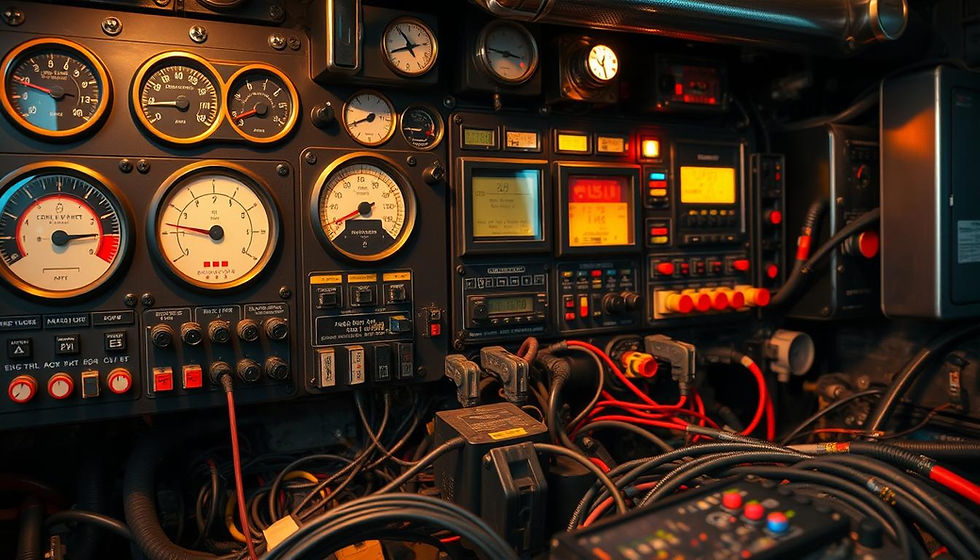Why Heavy Equipment Repair is Important for Your Business Success
- alanthetruckrepair
- Nov 23, 2024
- 4 min read

Heavy equipment, like bulldozers and excavators, plays a significant role in industries. It includes such as construction, mining, and farming. These machines make it possible to handle large jobs effectively. But, like any machine, they can break down over time. When they do, it can cause delays and cost money. Heavy equipment repair helps keep these machines working well. It prevents breakdowns and keeps projects on track. But why exactly is heavy equipment repair so essential? Let's explore the benefits and easy ways to keep your equipment in great shape.
Why Heavy Equipment Repair Matters
Regular repair and maintenance of heavy equipment are key for businesses. They rely on these machines every day. Repairing them not just keeps the equipment running. They also makes the job site safer and more productive.
Top Reasons to Prioritize Heavy Equipment Repair:
Reduces Downtime: Broken equipment stops work. Fast repairs help prevent lengthy delays.
Extends Equipment Life: Routine maintenance can help machines last longer. They save you money over time.
Improves Safety: Well-maintained equipment is safer to operate, lowering the risk of accidents.
Increases Efficiency: When equipment works as it should, jobs get done faster with fewer interruptions.
How Heavy Equipment Repair Benefits Your Business
Keeping your machines in good condition helps you stay on schedule and avoid extra costs. Here are a few benefits of regular heavy equipment repair:
Cuts Long-Term Costs: Preventive maintenance and early repairs stop minor issues from becoming big, costly problems.
Boosts Productivity: Equipment in good condition performs better. They help your team work faster and stay on track.
Maintains Equipment Value: Well-maintained machines hold their value better, so you'll get a higher return if you decide to sell or upgrade.
Ensures Safety Compliance: Regular repairs help your machines meet safety standards. Thus keeping everyone safe and following regulations.
Common Types of Heavy Equipment Repairs
Heavy equipment repair covers a wide range of areas, from engines to electrical systems. Here are some of the most common repairs:
Engine Repairs: The engine is the power source of any machine. Regular checks for issues like oil leaks or overheating keep engines running smoothly.
Hydraulic System Repairs: Hydraulic systems control movement. Fixing leaks and replacing worn parts keep them efficient.
Transmission Repairs: Transmissions face a lot of stress. Repairing gears and seals keeps them working smoothly.
Electrical Repairs: Batteries, wiring, and sensors can wear out over time. Regular checks and repairs help avoid electrical issues.
Structural Repairs: Heavy machines often face rough conditions that can cause damage. Repairs, like welding, restore the equipment's strength.
Undercarriage Repairs: Machines that run on tracks, like excavators, need undercarriage maintenance to stay efficient and mobile.
The Heavy Equipment Repair Process
Repairing heavy equipment requires skilled technicians and proper tools. Here's a look at the typical process:
Inspection and Diagnosis: Technicians inspect the equipment to find the source of any issues. They use tools to diagnose problems accurately.
Planning Repairs: They plan the repair work once they know what's wrong. It may include ordering parts and scheduling the job.
Performing Repairs: Technicians fix or replace damaged parts. They ensure everything is in good working order.
Testing: After repairs, they test the equipment to ensure it's safe and fully functional.
Record Keeping: Repair details are documented, which helps with future maintenance and keeps track of the equipment's history.
Choosing the Right Heavy Equipment Repair Service
A reliable repair service is essential for keeping your equipment in good shape. Here are some tips for choosing the right service provider:
Experience with Your Equipment: Choose a provider that knows your type of equipment. Experienced technicians make repairs faster and more accurately.
Certified Technicians: Reputable repair services hire certified technicians. They show that they're qualified to handle repairs.
Flexible Service Options: Some providers offer on-site repairs or emergency services. They help you minimize downtime quickly when repairs are needed.
Read Reviews: Check customer reviews and testimonials. It will help you to see if the provider is reliable and has good customer service.
Compare Prices and Warranties: Look for a provider with fair pricing and repair warranties so you know they stand by their work.
Tips to Avoid Heavy Equipment Failures
While repairs are necessary, preventive maintenance can help avoid breakdowns altogether. Here's how to keep your equipment running smoothly:
Regular Inspections: Routine checks catch problems early, preventing them from becoming more significant.
Follow Manufacturer Guidelines: Stick to the recommended maintenance schedule, like oil changes and filter replacements.
Train Operators: Properly trained operators handle equipment carefully. They help prevent unnecessary wear and tear.
Keep Records of Repairs: Document all repairs and maintenance. It helps you with future planning and track performance.
Use Quality Parts: Invest in high-quality replacement parts. Cheap parts might save money upfront but can lead to more breakdowns later.
Conclusion
Heavy equipment repair is essential for businesses that rely on these machines daily. Routine maintenance and fast repairs reduce downtime, improve safety, and extend equipment life. By working with a trusted repair service, scheduling regular inspections, and training operators, you can keep your equipment in great shape and your business running smoothly.
Investing in quality repairs may seem costly, but it saves you time, money, and trouble in the long run. Reliable equipment helps you meet deadlines. They help to keep clients happy, and grow your business confidently.





Comments